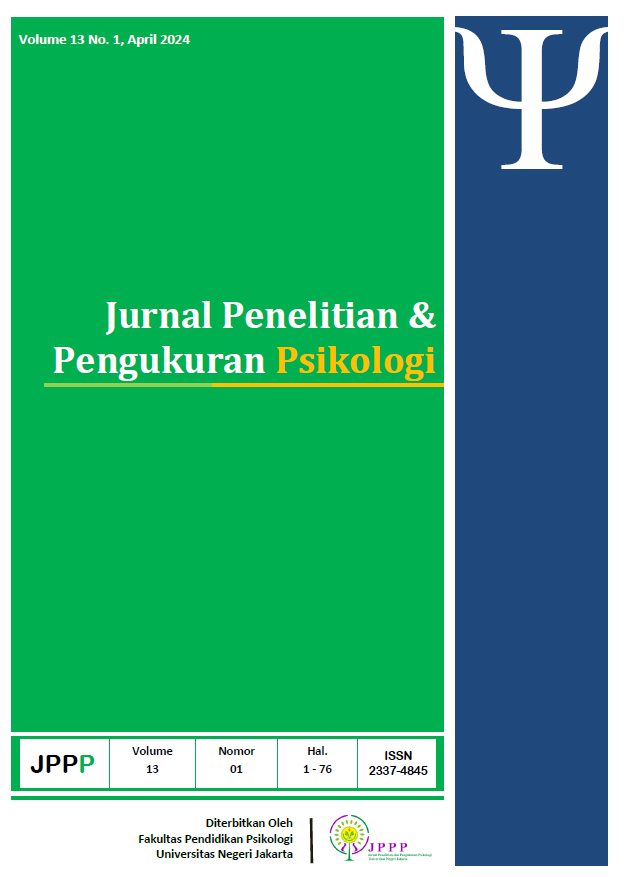The contribution of strength-based parenting and academic self-efficacy to student engagement in grades 4, 5 and 6 of SD Mutiara Harapan Pangkalan Kerinci Riau.
DOI:
https://doi.org/10.21009/JPPP.131.08Keywords:
Strength-Based Parenting, Academic Self-Efficacy, Engagement, Elementary School Students, Mutiara Harapan Pangkalan Kerinci RiauAbstract
This study aims to investigate the contributions of Strength-Based Parenting and Academic Self-Efficacy to the level of engagement among students at SD Mutiara Harapan Pangkalan Kerinci Riau. Strength-Based Parenting is an approach to parenting that focuses on developing a child's strengths and potential, while Academic Self-Efficacy refers to an individual's belief in his ability to face academic tasks. This study used a quantitative approach involving 102 students of SD Mutiara Harapan as the research participants. Data was obtained through a questionnaire that measured the level of Strength-Based Parenting, Academic Self-Efficacy, and student engagement. Data analysis was performed using regression techniques to examine the relationship between the variables studied. The results showed that Strength-Based Parenting and Academic Self-Efficacy significantly contributed to the level of engagement of SD Mutiara Harapan students. The higher the level of Strength-Based Parenting received by students and the higher the Academic Self-Efficacy that students have, the level of student engagement tends to increase. This research makes an important contribution to understanding the factors that influence engagement in elementary students, especially in the context of using the Strength-Based Parenting approach and developing Academic Self-Efficacy. The results of this study can provide practical guidance for parents and educators in strengthening student engagement through positive parenting approaches and building academic self-confidence.
References
Amir, R., Saleha, A., Jelas, Z. M., & Ahmad, A. R. Hutkemri.(2014). Students’ engagement by age and gender: A cross-sectional study in Malaysia. Middle-East J. Sci. Res, 21(10), 1886-1892.
Brown, C. et al. (2021). Examining the Relationship Between Parenting Practices, Academic Self-Efficacy, and Student Engagement in Elementary School. Journal of Educational Psychology, 113(1), 75-91.
Fadri, N., & Khafid, M. (2018). Peran Kecerdasan Spiritual Memoderasi Pengaruh Dimensi Fraud Diamond Dan Self-Efficacy Terhadap Kecurangan Akademik. Economic Education Analysis Journal, 7(2), 430-448.
Honicke, T., & Broadbent, J. (2016). The influence of academic self-efficacy on academic performance: A systematic review. Educational Research Review, 17, 63-84.
Hurlock. (1980). Psikologi Perkembangan: Suatu Pendekatan Sepanjang Rentang Kehidupan. Jakarta: Penerbit Gramedia.
Jang, H., Kim, E. J., & Reeve, J. (2016). Why students become more engaged or more disengaged during the semester: A self-determination theory dual-process model. Learning and Instruction, 43, 27–38. https://doi.org/10.1016/j.learninstruc.2016.01.002
Johnson, B. et al. (2020). Factors Affecting Student Engagement in Higher Education: A Meta-Analysis. Educational Research Review, 30, 100326.
Liem, A. D., Lau, S., & Nie, Y. (2018). Academic self-efficacy and academic achievement: Meta-analytic evidence. Educational Psychology Review, 30(3), 821-846.
Madden, W., Green, S., & Grant, A. M. (2011). A pilot study evaluating strengths-based coaching for primary school students: Enhancing engagement and hope. International Coaching Psychology Review, 6(1), 71–83.
Marks, H. M. (2000). Student engagement in instructional activity: Patterns in the elementary, middle, and high school years. American Educational Research Journal, 37(1), 153184.
Pinantoan, A. (2013). The Effect of Parental Involvement on Academic Achievement.
Purnomo, C. H. (2016). Manajemen Pembelajaran Kurikulum International Baccalaureate Primary Years Programme di SD Ciputra Surabaya. Inspirasi Manajemen Pendidikan, 4(2).
Rufaida, A. R. A., & Prihatsanti, U. (2018). Hubungan efikasi diri akademik dengan Engagement pada siswa fsm undip yang bekerja paruh waktu. Jurnal Empati, 6(4), 143-148.
Schunk, D. H., & Usher, E. L. (2019). Social cognitive theory and motivation in education. In Handbook of motivation at school (2nd ed., pp. 79-98). Routledge.
Skinner, E. A., Kindermann, T. A., & Furrer, C. J. (2008). A motivational perspective on engagement and disaffection. Educational and psychological measurement, 69(3), 493– 525. https://doi.org/10.1177/001316440832 3233
Smith, A. et al. (2019). The Role of Strength-Based Parenting and Academic Self-Efficacy in Student Engagement. Journal of Educational Psychology, 111(3), 431-446.
Sugiyono. (2010). Metode Penelitian Pendidikan (pendekatan Kuantitatif, Kualitatif, dan R&D). Bandung: Alfabeta.
Sumargi, A., Sofronoff, K., & Morawska, A. (2015a). A randomized-controlled trial of the Triple P-Positive Parenting Program seminar series with Indonesian parents. Child Psychiatry & Human Development, 46, 749-761. doi: 10.1007/s10578- 0140517-8.
Waters, L. E., Loton, D., & Jach, H. K. (2018). Does strength-based parenting predict academic achievement? The mediating effects of perseverance and engagement. Journal of Happiness Studies. Advance online publication, 1-20. doi: 10.1007/s10902-018- 9983-1
Waters, L., & Sun, J. (2016). Can a brief strength-based parenting intervention boost selfefficacy and positive emotions in parents? International Journal of Applied Positive Psychology, 1, 41-56. doi: 10.1007/s41042-017-0007-x
Waters, L., Sun, J. Can a Brief Strength-Based Parenting Intervention Boost Self-Efficacy and Positive Emotions in Parents?. Int J Appl Posit Psychol 1, 41–56 (2016). https://doi.org/10.1007/s41042-017-0007-x
Yeager, D. S., Henderson, M. D., Paunesku, D., Walton, G. M., D'Mello, S., Spitzer, B. J., & Duckworth, A. L. (2019). Teaching a lay theory before college narrows achievement gaps at scale. Proceedings of the National Academy of Sciences, 116(13), 5552-5557.
Zurriyati, E., & Mudjiran, M. (2021). Kontribusi perhatian orang tua dan motivasi belajar terhadap keterlibatan siswa dalam belajar (student engagement) di sekolah dasar. Jurnal Basicedu, 5(3), 1555-1563.







